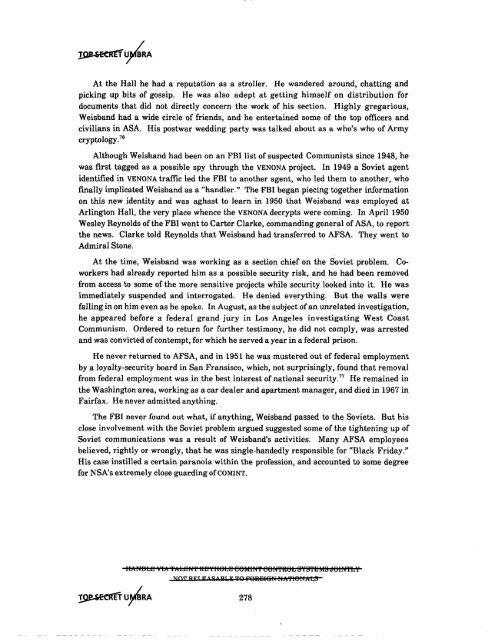American Cryptology during the Cold War - The Black Vault
American Cryptology during the Cold War - The Black Vault
American Cryptology during the Cold War - The Black Vault
Create successful ePaper yourself
Turn your PDF publications into a flip-book with our unique Google optimized e-Paper software.
At <strong>the</strong> Hall he had a reputation as a stroller. He wandered around, chatting and<br />
picking up bits of gossip. He was also adept at getting himself on distribution for<br />
documents that did not directly concern <strong>the</strong> work of his section. Highly gregarious,<br />
Weisband had a wide circle of friends, and he entertained some of <strong>the</strong> top officers and<br />
civilians in ASA. His postwar wedding party was talked about as a who's who of Army<br />
cryptology.76<br />
Although Weisband had been on an FBI list of suspected Communists since 1948, he<br />
was first tagged as a possible spy through <strong>the</strong> VENONA project. In 1949 a Soviet agent<br />
identified in VENONA traffic led <strong>the</strong> FBI to ano<strong>the</strong>r agent, who led <strong>the</strong>m to ano<strong>the</strong>r, who<br />
finally implicated Weisband as a "handler." <strong>The</strong> FBI began piecing toge<strong>the</strong>r information<br />
on this new identity and was aghast to learn in 1950 that Weisband was employed at<br />
Arlington Hall, <strong>the</strong> very place whence <strong>the</strong> VENONA decrypts were coming. In April 1950<br />
Wesley Reynolds of <strong>the</strong> FBI went to Carter Clarke, commanding general of ASA, to report<br />
<strong>the</strong> news. Clarke told Reynolds that Weisband had transferred to AFSA. <strong>The</strong>y went to<br />
Admiral Stone.<br />
At <strong>the</strong> time, Weisband was working as a section chief on <strong>the</strong> Soviet problem. Coworkers<br />
had already reported him as a possible security risk, and he had been removed<br />
from access to some of <strong>the</strong> more sensitive projects while security looked into it. He was<br />
immediately suspended and interrogated. He denied everything. But <strong>the</strong> walls were<br />
falling in on him even as he spoke. In August, as <strong>the</strong> subject ofan unrelated investigation,<br />
he appeared before a federal grand jury in Los Angeles investigating West Coast<br />
Communism. Ordered to return for fur<strong>the</strong>r testimony, he did not comply, was arrested<br />
and was convicted ofcontempt, for which he served a year in a federal prison.<br />
He never returned to AFSA, and in 1951 he was mustered out of federal employment<br />
by a loyalty-security board in San Fransisco, which, not surprisingly, found that removal<br />
from federal employment was in <strong>the</strong> best interest of national security.77 He remained in<br />
<strong>the</strong> Washington area, working as a car dealer and apartment manager, and died in 1967 in<br />
Fairfax. He never admitted anything.<br />
<strong>The</strong> FBI never found out what, ifanything, Weisband passed to <strong>the</strong> Soviets. But his<br />
close involvement with <strong>the</strong> Soviet problem argued suggested some of <strong>the</strong> tightening up of<br />
Soviet communications was a result of Weisband's activities. Many AFSA employees<br />
believed, rightly or wrongly, that he was single-handedly responsible for "<strong>Black</strong> Friday."<br />
His case instilled a certain paranoia within <strong>the</strong> profession, and accounted to some degree<br />
for NSA's extremely close guarding ofCOMINT.<br />
ltA:IfBt.oE VtA: 'fttt.oEH"f IEEYII6LE e6MIIff e6U'fR6L SYS'ftJMSiJ6IU'fLY<br />
NOT REI E" 'a A Ubi: 1'Q FQRBI8N Wd'16H*L~<br />
278
















